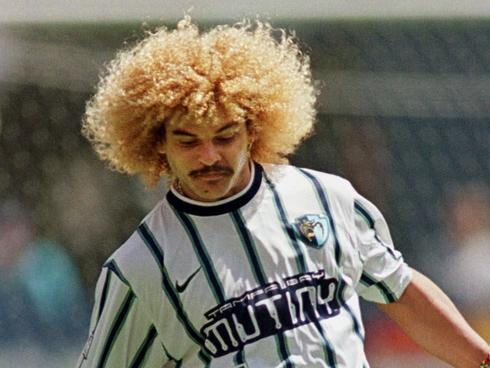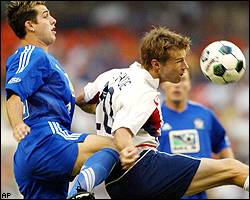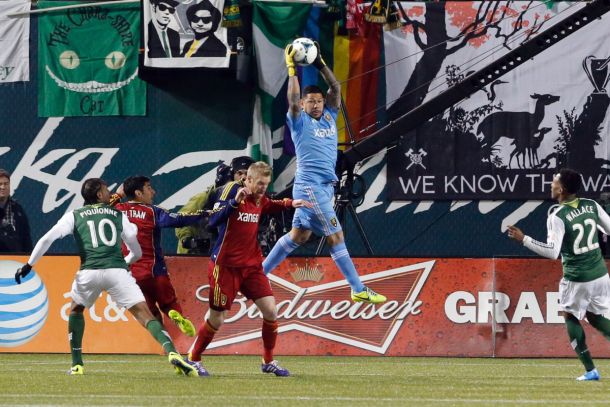On Wednesday, August 6th the MLS All-Stars will face off with Bayern Munich from Providence Park in Portland, Oregon. The game is scheduled to kick off at 9:30 ET, with television coverage on ESPN2. In what will be the 19th installment of the MLS All-Star Game, the MLS All-Stars will take on European opposition for the 10th time, and have only won one of the last five games.
The first MLS All-Star Game took place back in 1996, and featured a battle between the Western Conference and the Eastern Conference, as the East beat the West 3-2 in front of a crowd of 78,416 fans at Giants Stadium. The first installment of the All-Star game featured legendary American soccer and MLS names such as Tab Ramos, Brian McBride, Carlos Valderrama, Alexi Lalas, Jeff Agoos, Tony Meola, Cobi Jones, Jason Kreis, Eric Wynalda, and Roberto Donadoni. Valderrama was named MVP, and there was a much smaller talent pool than there is now. Of the teams represented in that first game, five of the ten are now either defunct or have undergone a rebranding.

In spite of the popularity of the first game, the game struggled to continue to grow its popularity. As average league attendance fell, so did All-Star Game attendance. In 2000, the league shifted from hosting the games in big NFL stadiums to smaller, soccer specific stadiums so that there were fewer noticeable empty seats.
In 2002, the league decided to try something else to revive the game. The 2002 MLS All-Star Game was played in front of 31,096 fans at RFK Stadium in Washington, D.C. as the MLS All-Stars beat a collection of United States Men’s National Team players 3-2. It was a move that seemed not to make much sense, as many of the USMNT selection for the game come from MLS, it seemed to leave the MLS with just the leftovers. Players such as Landon Donovan, Cobi Jones, and Tony Meola all played for the USMNT instead of the league that they play in, and as the format of the game seemed counterproductive, it was never repeated.

The 2003 MLS All-Star Game was once again played in a soccer specific arena, The Home Depot Center, and was the first time that a united MLS squad played against a club side from another country. The MLS All-Stars beat Chivas Guadalajara 3-1 in front of a near capacity crowd in Los Angeles, and Guatemala international Carlos Ruiz earned MVP honors for his goal, which was the first of the game.
In 2004, MLS tried going back to the East - West format, and it again seemed not to work. For the second time in three years, the game was brought back to Washington, D.C. and RFK Stadium, but this time attendance decreased by nearly 10,000. In this installment, Honduran international Amado Guevara was named the MVP as he produced a virtuoso performance scoring a brace and adding an assist. It was the sixth time that the East faced off with the West, and the East All Stars were able to extend their record to 4-1-1.
The 2005 MLS All-Star Game marked the first time that European opposition squared off with an MLS All-Star squad. Fulham Football Club were welcomed to Crew Stadium in Columbus, Ohio and were then soundly beaten 4-1 by the MLS All-Stars. In this game, it was Taylor Twellman putting in a virtuoso performance to earn MVP honors. Twellman scored the opening goal, and seemed to be buoyed by his performance in the game as he won both MLS MVP and Golden Boot honors that season. The game also marked a wonderful homecoming for Columbus Crew great Brian McBride who started for Fulham in the game.
The 2006 edition proved yet another landmark moment for MLS. They welcomed reigning English Premier League champions Chelsea FC to Toyota Park in Chicago, and through a Dwayne de Rosario goal the American side proved 1-0 victors. Although it was on Chelsea's preseason tour, they played a nearly first choice XI that included names such as Terry, Lampard, Essien, Drogba, Ballack, Shevchenko, and Robben. It was yet another step in the right direction for MLS, and it would not prove to be the only time that Chelsea would be the opposition for a massive result in favor of MLS.
The 2009 MLS All-Star game played in front of a capacity crowd at Rio Tinto Stadium in Salt Lake City, Utah. As the MLS All-Stars lost 1-1 (4-3 penalties) to Everton, history was once again made as this was the first time that European opposition would beat an MLS All Star squad, and it would prove to be the start of a worrying trend for MLS. Tim Howard was the MVP this time and he proved to be the hero for Everton while saving three of six penalties. Everton missed their first two penalties, but were able to come back through Howard's individual brilliance.
In both 2010 and 2011, Manchester United would be the opposition for MLS, and they would dish out two embarrassing results for the American side. In 2010, before a crowd of 70,728 at Reliant Stadium in Houston, United dished out a sobering 5-2 defeat while playing a largely reserve side. In truth, the deficit could have been much larger as United went very close to scoring on several other occasions but were unable to. In 2011, before a sold-out crowd at Red Bull Arena, United completely dismantled the MLS side 4-0 playing a largely first choice XI. This was United's fourth game on that summer's tour, and had already dismantled Seattle, Chicago, and New England.
In spite of the two disheartening defeats in a row, 2012 was to prove the MLS All-Stars' biggest ever win. PPL Park in Philadelphia was the setting for the All-Stars to welcome reigning European champions Chelsea, and in a well-played game from both sides the All Stars emerged victorious 3-2. Chelsea entered the off-season off the back of their greatest ever triumph, and two of their biggest stars, John Terry and Frank Lampard, both played big roles in this game.
In last season's edition, the MLS All-Stars were vanquished 3-1 by an AS Roma side featuring American star Michael Bradley. Before the largest crowd in the history of Sporting Park in Kansas City, AS Roma played with more intensity and execution than is often seen in a preseason friendly. Their great preseason form carried into the start of their 2013-14 Serie A season as they won 10 games in a row to start the season. Within five minutes, Roma midfielder Kevin Strootman opened the scoring. Although it was only 1-0 at halftime, Roma dominated the first half and it carried into the second as they found themselves 3-0 up after 68 minutes. It was only in stoppage time that the All Stars were able to pull back a consolation goal through LA Galaxy defender Omar Gonzalez.
Although we do not yet know what Wednesday's game will bring, it will surely prove to be yet another unforgettable occasion. Check back with VAVEL USA for the latest coverage.

